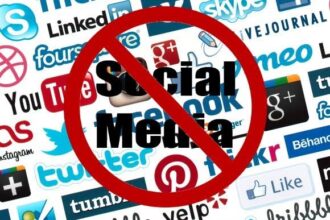A bold new bill aims to make it illegal for anyone under 18 to use major social media platforms, even if their parents give the green light.
This isn’t just about stricter parental controls; it’s a direct government intervention raising fundamental questions about youth well-being, parental rights, and digital freedom.
So, is a Teen Social Media Ban truly the answer to a growing crisis? Let’s unpack this heated debate.
The Shockwave from Texas: What’s Happening?
The state of Texas is at the heart of this legislative storm. House Bill 186, an online child safety bill, has already passed its House and is expected to pass the state Senate. If signed into law, it would make Texas the very first U.S. state to outright ban minors under 18 from signing up for social media accounts.
Here’s the core of what the bill mandates:
- Under-18 Ban: It would be illegal for anyone under 18 to use platforms like TikTok, X, Facebook, and Snapchat.
- Mandatory Age Verification: By April 2026, social media companies would be required to implement rigorous age verification processes for all users.
- No Parental Override: Crucially, this isn’t just about parental consent; the ban would apply even if parents say it’s okay for their children to use these platforms.
Adding to the complexity, the tech giants are already at odds. Apple and Google, who manage the app stores, are reportedly clashing with app makers like Meta, Snap, and Match Group over who exactly should bear the responsibility for this age verification process.
Why Supporters Say “Yes!”: The Mental Health Crisis Link
For those pushing for this ban, the rationale is stark and deeply concerning. Supporters believe drastic action is long overdue to combat what they describe as a rising mental health crisis among teenagers.
- Alarming Statistics: They point to reports, like those from the CDC, showing a disturbing increase in suicide rates among teens aged 10-24, with social media often cited as a contributing factor.
- The “Bad for Kids” Argument: Proponents argue that excessive social media use fuels depression, anxiety, cyberbullying, and negative self-image, making these platforms inherently “bad for kids.” They believe the immersive, addictive nature of social media environments is simply too powerful for developing minds to handle responsibly.
- Desperate Measures: For these supporters, the potential ban is a necessary, albeit drastic, step to shield children from documented harms that voluntary measures or parental controls have apparently failed to prevent.
Why Critics Say “Hold On!”: Freedom, Privacy, and Parental Rights
However, the bill has drawn sharp criticism from various camps who argue it goes too far.
- Government Overreach vs. Parental Rights: A central argument is that the right to safeguard children from social media’s potential downsides should belong solely to parents, not the government. Critics contend that the state shouldn’t override parental discretion, especially when families might use social media for positive connections or educational purposes.
- Privacy Concerns: Privacy advocates are sounding alarms about the invasive nature of mandatory age verification. They warn that requiring users to upload IDs or other sensitive data poses significant risks to personal data security, potentially creating a new trove of vulnerable information for hackers.
- Alternative Solutions: Many opponents suggest that instead of an outright ban, lawmakers should push social media companies to develop better, more robust parental management tools. These tools could allow parents to monitor content, limit screen time, or restrict certain features, giving families more control without infringing on broader freedoms.
The Broader Conversation: Beyond Black and White
The debate over the Teen Social Media Ban is not a simple one. It highlights a complex tension between protecting vulnerable youth and upholding individual liberties.
Parents themselves are divided. Some welcome the potential ban, hoping it will curb screen addiction and improve their children’s mental well-being. Others fear it will alienate teens, cut them off from important social connections, and strip away their autonomy.
This situation also forces a re-evaluation of the responsibilities of social media companies. Should they do more to self-regulate, implement stricter age gates, or invest in better safety features? Or is the burden of proof, and therefore the regulation, now shifting firmly to governments?
What This Means for the Future of Social Media (and Teens)
As of May 2025, if Texas signs this bill into law, it could set a powerful precedent. Other states, and even other countries, might consider similar legislative actions.
This bill signifies a growing global concern about the impact of social media on young people and a rising willingness by governments to intervene.
Regardless of the outcome in Texas, the conversation is far from over. It prompts all of us – parents, educators, policymakers, and platform developers – to rethink how we guide the next generation through an increasingly digital world, balancing the immense opportunities with the undeniable risks.






